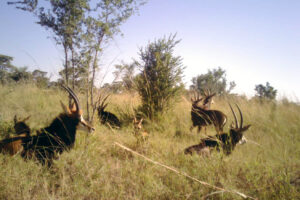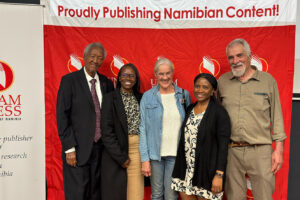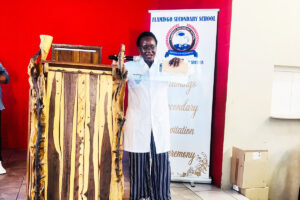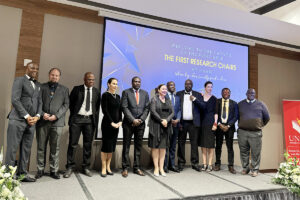Marika Matengu, a teacher by profession, has served in various developmental projects in Namibia and is currently working as a lecturer at the Khomasdal Campus and a doctoral scholar at the University of Oulu, Finland.
As the first semester of 2019 is coming to an end at the Khomasdal campus, she is also wrapping up her office in preparation for relocating back to Finland this month.
This is her story.
Two and a half years ago, I joined a dynamic team of teacher educators at the University of Namibia, Khomasdal campus, which is situated in the suburb of Khomasdal, Windhoek, in a previously marginalized area. With this campus the University was brought closer to the community of Northwest Windhoek. It is centrally located, just within walking distance from the Medical campus, and other medical facilities.
According to the Assistant Pro-Vice Chancellor, Dr. Amaambo, the campus is known as “the beacon of hope for many aspirant teachers and educators” who have interest in early childhood and primary education.
Three different educational programmes are hosted by the Khomasdal Campus: the Diploma in Junior Primary Education, Honours Degree in Junior Primary Education and Honours Degree in Upper Primary Education. There are also students with disabilities and from marginalized/ ethnic communities to whom specialized services are provided. The high number of students makes the teacher training programmes some of the biggest programmes of the University.
Feature Pic: Cultural and linguistic diversity is celebrated at Khomasdal campus (left to the right). Ms. Marika Matengu, lecturer, Dr. Amaambo, Assistant Pro-Vice Chancellor, Ms. Richardine Poulton-Busler, lecturer

Currently, Khomasdal campus has been training teachers as part of the University of Namibia for nine years. During these years, several changes in the field of education have taken place: free education system has been expanded, pre-primary education has been made as part of the public education system, education act and various policies tackling educational inequality have been put in place, curriculum has been revised and emphasis placed on learner-centered approach and importance of play in early learning.
These are great successes and important milestones in reaching the most vulnerable children. However, many challenges remain. The high number of student teachers make it challenging to provide transformational teacher training that equips students with strong theoretical and practical skills of education.
Regardless of the challenges, there are many exciting developments at the Khomasdal campus. International experiences and expose have played an important role in bringing innovative and fresh ideas to the teacher training programme. Mr. Gustaf who is a music lecturer and Mr. Andre who is a drama lecturer, are just two of the teacher trainers who have graduated recently with their Master’s in Education from the University of Eastern Finland. Both of them acknowledge that the Finnish teacher training has given them a strong foundation to teach at Khomasdal.
Teacher training in Khomasdal serves a unique community of Namibians. Its programmes are interwoven to the culturally and linguistically rich environment for which the campus has been training teachers for years. As part of the University, lecturers are now involved in the international collaboration, research and material development through which the educational needs of the nation can be met. Early childhood and pre-primary education is certainly at the core of the future directions. Teachers play a vital role in national building. One can say that teacher is a maker of man. He is the foundation of all Education, and thus the whole civilization of mankind, present and future. This is certainly true, in any given country or context.





